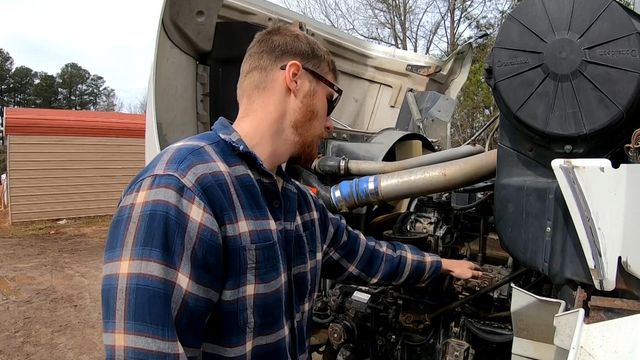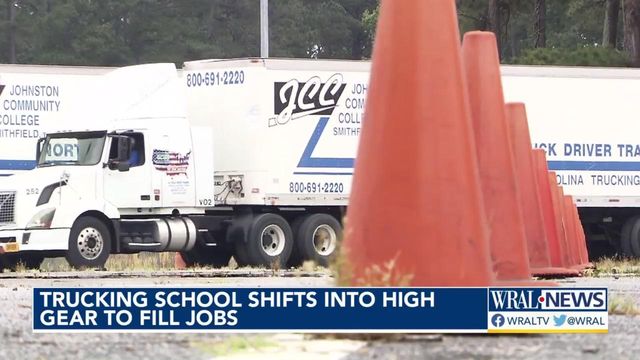Truck drivers in NC will now be required to complete classroom training, per new federal requirement
Getting licensed to drive a truck or school bus will now require an additional training, according to new federal mandates put in place this week.
Experts say that while the stricter requirements on a commercial driver's license will make the roads safer, it will also create more fees for prospective truckers.
Before this week, for someone to get their commercial driver’s license, they only had to pass a written test and driving test. No formal training has been required in North Carolina until now.
The new federal requirement comes as the nation battles a major shortage of certified truckers and bus drivers.
"The market is hot right now," said DJ Dunlap, an Army veteran training to be a trucker.
For him, a CDL is a ticket to support his family. The 27-year-old already has a job offer, even before he's graduated from trucker school.
"It was a lot easier than I thought, actually," he said.
The four-week program at Carolina Trucking Academy, where Dunlap attends, is not changing, but the classroom and on-the-road instruction that used to be optional are now required for all CDL holders.
While trucks are one of the most popular ways to transport commerce in the U.S., it is not necessarily the safest. According to the insurance consulting website PolicyAdvice, more than 70% of all U.S. products reach their destination via truck.
“Some of those trucks that have been whisking by you on I-95, many of the drivers had never had any training," said Charlie Gray, president of Carolina Trucking Academy.
Gray, who opened the school 22 years ago, said the new entry-level driving training has been a long time coming.
Truck-related crashes have been increasing since 2009, according to the Federal Motor Carrier Safety Administration. In North Carolina alone, there were more than 5,700 crashes involving a large truck or bus in the first half of 2021.
“Lawyers have to be trained. Nurses have to be trained. Accountants have to be trained," Gray said. "Why not truck drivers? It’s a very serious endeavor.”
DMV records show North Carolina added more than 20,000 new CDL drivers in 2019, but that figure dropped off in 2020. Putting that year aside, the 17,565 new drivers added in 2021 is the lowest number added since 2013.
"The problem that we are having now is our older truck drivers are retiring, and our younger guys are coming along," Gray said. "Our young people just for some reason don't want to do it."
The new required training could be a roadblock for prospective truckers as it now costs people more to get their license.
"I think it's a double-edged blade," Dunlap said. "I think partially it’s an advancement with the intention of making it safer for people who are driving trucks, but I also see on the other end. It discriminates against people who can’t afford the $5,000 or $10,000 is costs to go to school.”
Gray said his $5,000 program is an investment for a first-year salary upwards of $60,000.
“The bottom line is it will put safer drivers on the highway," Gray said.
A more cost effective option could be getting certified through a local community college:
- Fayetteville Tech's trucker training costs $538 for 10 weeks
- Vance-Granville Community College training costs $1,876 for nine weeks
- Nash Community College's trucker training course costs $3,995 for five weeks
- Johnston County Community College’s truck driver training school costs $1,153 for in-state students for eight weeks
The new training only applies to new CDL holders, not those with valid licenses. It also applies to bus drivers, who need a less advanced Class-B CDL. Many school districts in central North Carolina told WRAL News that they are willing to pay for CDL certification for prospective drivers.











